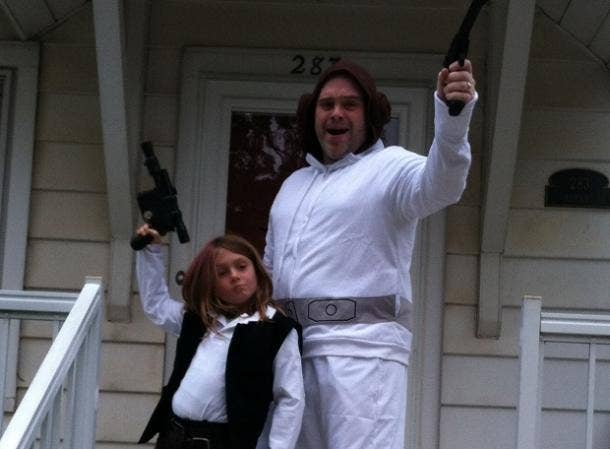
You’re not alone.
By Tom Burns — Written on Dec 27, 2016
Photo: getty

2016’s cruel streak continued this week with the announcement that author and movie star Carrie Fisher died today at the age of 60 after suffering a heart attack on a London to Los Angeles flight on Friday, December 23rd.
Her daughter Billie Lourd released this statement — “It is with a very deep sadness that Billie Lourd confirms that her beloved mother Carrie Fisher passed away at 8:55 this morning. She was loved by the world and she will be missed profoundly. Our entire family thanks you for your thoughts and prayers.”
I have to say, this one… hurts.
Carrie Fisher was a cultural icon for all of the right reasons.
She lived her life loudly, defiantly, unashamed. Her life made a difference for so many people around the world, in so many different ways.
She was a writer, an actor, the daughter of two Hollywood legends — Debbie Reynolds and Eddie Fisher. She advocated for mental health issues, she spoke openly and honestly about her struggles with addiction, and she loved the crap out of her dog, Gary.
And, yes, she was Princess Leia.
If you have any doubt about the global impact of that role, consider that, the day that Carrie Fisher died, over 39 years after Star Wars was released, the number one movie at the international box office was Rogue One, a cinematic tribute to Fisher’s original Star Wars story that (potential spoiler alert) ends with the idea that the universe might only be saved by the hope delivered by Princess Leia.
40 years later, her role as a symbol of rebellion is still resonating with audiences everywhere.
Fortunately, despite the unceasing fan attention (and occasional snarky remarks she made about her life as a Star Wars princess), Fisher did seem to ultimately appreciate being Leia.
In her most recent memoir The Princess Diarist (only released last month), Fisher commented:
“And as much as I may have joked about Star Wars over the years, I liked that I was in those films. Particularly as the only girl in an all-boy fantasy. They were fun to make. It was an anecdote of unimaginable standing.
I liked being Princess Leia. Or Princess Leia's being me. Over time I thought that we'd melded into one. I don't think you could think of Leia without my lurking in that thought somewhere. And I'm not talking about masturbation. So Princess Leia are us.”
I couldn’t agree more. We are all Princess Leia.
We all wish that we could be as bold, quick, and devoted as the woman that Carrie Fisher brought to life across her various Star Wars movies.
I’m speaking from personal experience here — a few years ago, after watching Star Wars for the first time, my daughter decided that she wanted to dress as Han Solo for Halloween and asked me, in turn, to dress as Princess Leia.
I jumped at the chance, because, gender be damned, Princess Leia is the coolest. I was PROUD to go out in public dressed as Carrie Fisher and people loved it. (The photos went briefly viral.) And I wasn’t the only one — men like Jimmy Kimmel and Chris Pratt have all worn Princess Leia costumes because she was just too cool.

Instagram/buildingalibrary
Carrie Fisher’s take on a princess transcended gender in a way that few film characters have ever done before. She was both a role model for my daughter and an aspirational symbol of what I hoped I could become one day.
But Carrie Fisher will be remembered for far more than just Star Wars.
Her acting resume is filled with highlights. I personally have a tremendous amount of affection for her roles in The Blues Brothers (pretty handy with a rocket launcher), The ‘Burbs (made a great foil for Tom Hanks), and When Harry Met Sally (she was the honest female friend we all wished we could have). But that represents just a small portion of her overall body of work.
Shampoo, Hannah and Her Sisters, Soapdish… and that doesn’t even get into her TV work. She KILLED as Liz Lemon’s writer role model on 30 Rock and her devastatingly mean take as Rob’s mother on Amazon’s Catastrophe was a highlight of the series.
Beyond her acting work, Fisher will also be remembered for her writing, because, as anyone can tell from any interview she’s ever given, Carrie Fisher knows how to tell a story.
Her first novel, Postcards from the Edge, offered a thinly veiled fictionalization of her life, following a movie star with a famous mother who was trying to recover her career and sense of self after battling addiction for years. It’s frank, funny as hell, and incredibly moving. (The Meryl Streep movie adaptation of the book is pretty fantastic too.)
Related Stories From YourTango:
That kicked off a second phase of Fisher’s career — as someone known for speaking the truth, no matter how difficult or revealing those truths might be. She continued to write screenplays and novels until she shifted in 2008 and wrote her first flat-out memoir, Wishful Drinking.
Her personal stories just made us love her even more. They confirmed what we always thought — Carrie Fisher had troubles, anxieties, triumphs and tragedies, and a lovely soul.
Forget Princess Leia. WE ARE ALL CARRIE FISHER.
That's why this hurts so much. She was us at our most raw and revealed. We should all hope that we live our lives as honestly as she did. Or that we can make a similar impact with just a few words, images, or stories.
Because Carrie Fisher, across all of the various mediums that she occupied throughout her life, was a storyteller.
We are LUCKY that we lived in a world where we got to hear her stories, and we are forever lessened now that those stories are at an end.
YourTango may earn an affiliate commission if you buy something through links featured in this article.

